Photo Credits: Danielle at Mizchief Media
Hello Karsh, thanks for taking some time out to talk with Hyphen Magazine. How are you?
Good. Thanks for making this happen.
Let me tell you a bit about the impetus behind writing this article. I am interested in learning more about the intersection of traditional forms of classical Indian music and their convergence with the contemporary, but in a deeper sense…really talking about what goes into learning the music, and what it is like to be someone who is or is not of lineage when approaching these massive art forms. Before we get to that though, I would like to learn more about what you are working on right now.
First of all, I am working on a few different projects. I just released Broken English (Available on Six Degrees Records) and so I am doing live concerts with my band Realize. I am also doing DJ events with Kollective, which is a national DJ collective party that I started last year with a number of resident DJs across the country. We are going to be releasing a CD as well. I am also working on an album with Anoushka Shankar, so all of that is keeping me pretty busy.
How important has being diverse and bringing in diverse instrumentation/influences into your music been?
There is always diversity in my music…being an artist myself growing up in America, it was always important to attract a wider audience…this is something I have always tried to do in my own life as well. I always try to take what I have and where I come from and make that tangible and understandable to everyone in my environment.
Tell me about your childhood, growing up and your early exposure to music.
I always wanted to play music, since I was child. I never imagined it becoming a career though…I never knew what that meant for music to be a career. I just went through life playing music. Reality plays a big role in the music that you make. As a south Asian, I played both Indian music and all styles of western music, as a drummer and a producer and it wasn’t until the last 12 years of my life that I began to incorporate the two into one world.
What kind of support did you have from your family?
I did have a lot of support playing music. My father is very musical as well. He was the one who introduced a lot of music to me growing up. My family has always been very supportive. I am the youngest of three, so my brother and sister got a lot of the brunt of what a lot of older siblings get. It was kind of no question for them [that I pursue my musical passions]…they would have been surprised if I didn’t play music.
Tell me about your father, his influence on you and his connection to music?
He was a doctor, but he had been playing music since he was a child. He probably could have pursued it professionally. At that time for him in India, though, it was the kind of industry that if you weren’t born into the music industry, you didn’t have a chance. So he decided to go into medicine. He would have excelled at anything he got involved with. But once he came to America, music was one of the few things he could really bring with him…of all the family, he has 4 brothers and 1 sister, he was the most musical in the family.
Was your mother influential in your music?
My mother was definitely supportive. She also sings, and my parents would always have music parties in our home…my parents would break out the harmonium, start singing, and I would play tabla. It was a regular thing in my house.
Tell me about your early training in tabla and who you learned from initially.
I studied with three different teachers over a total of 1or 2 years with each teacher…the rest of the time I spent by myself. I spent a lot of time playing with people, accompanying. Because of my father’s involvement with the performing arts in the Indian community and performing arts, there were a lot of musicians coming to our house, so I was playing with a lot people. So, I spent most of my time learning tabla by watching tabla players and learning from them, retaining as much information as I could. I think probably the way I learned tabla was not the right thing to do, but because of the way I learned tabla, what I learned of tabla, I was able to quickly jump into many different worlds… but as an Indian musician, as far as being a proper tabla player, I definitely scattered my brain a little bit.
Do you wish you could focus more on your practice of tabla?
I always do, and now it is a matter of time. The question is, “Do I have the time to stop everything I am doing and devote the time to the study of a craft?” At this point in my life, if I was spend that much time with a Guru, I would probably wind up playing a stringed instrument. I find myself gravitating more towards sarode or sarangi or sitar, and really wanting to study something like that and stopping everything I am doing, as opposed to learning tabla.
For me, it is really about tapping into the source of where this music comes from. That is the reason I perform as a DJ, drummer or tabla player. But when I am in the studio, I am a composer and so I am singing music to artists and musicians, and working with different musicians and instrumentalists, so I want to be able to get to that source, and the source of that music…because I have been working with some great Indian musicians, I am learning the other side of music as well, besides the tabla which I have focused on earlier in my life.
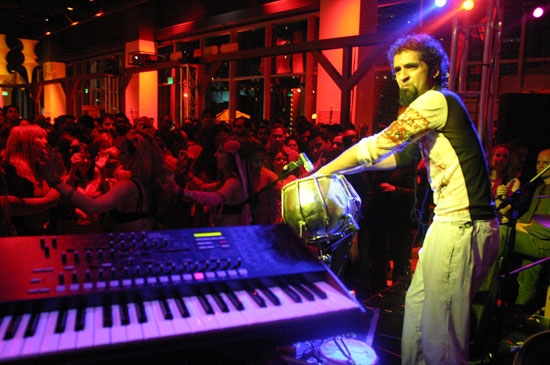
Karsh at the Project Ahimsa Global Sight & Sound 2003 Photo Credit: Danielle at Mizchief Media
What is it like learning music here as opposed in India? Can you talk a little bit about what you see in your travels and how you see audiences and performers differ in terms of their approach of understanding and performing music?
At this point, anything that is possible here is possible in India. I have seen parallels to my experiences all over in India or wherever I travel…I think that circumstances for creativity have change dramatically over the last 10 -15 years in India. So as far as classical music, people have changed as well. People are seeing that their own music is being interpreted in these different ways. And they are hearing that it is retaining its essence…so artists like the Midival Punditz get a lot of respect from Indian classical artists as well, because they hear the understanding of the music in the music.
Can you talk about your approach to collaborating with musicians who are classically trained, and those who are not?
I think for musicians to be involved in anything, they need to know that their artform is really understood. Before I was working as a producer with different artists, I was working as a session musician playing tabla and being a drummer on a lot of different albums. Especially as a tabla player or as a drummer focused on Indian music within hip hop, jazz, pop rock or whatever I was doing at the time, I noticed how different artists were aware of what I was bringing to the table…it was a learning process about how to create the right atmosphere for artists when they come to work with me. For instance, I don’t like to put a label on something that I am going to do this kind of track or that kind of track. I see a picture and within that picture I like to play a rhythm and I program it in a particular style depending on the situation. So, when I am playing for an Indian classical musician, I’ll play it on tabla instead of drumset. It might wind up in dadra (6 beat rhythmic cycle) or rupak taal (7 beat rhythmic cycle).
They will understand it, and they will better understand my composition…Once I capture that, I take that to a different realm.
Have you worked with many artists who have a difficult time understanding your approach or your music?
If I gravitate towards an artist it is because we both understood what each other does…I haven’t found myself in situations where people are not understanding…If people are really good at what they do, you will understand far more than that track…Today in the contemporary world of music, everywhere I have gone, especially in India where I have worked with young classical musicians, they hear western chord changes, and they hear attitude changes. It is more than just classical raas that existed for them…There is more to the world and they understand different attitudes in music.
Has the approach to making music in India evolved dramatically over the past 10 – 15 years?
I think it has really evolved, because before there were not a lot of artists, there were a lot more producers…there were definitely a handful of artists, but they were being directed by producers. But what has happened in the last 10 years is that there are a lot of artists who are born out of the sound. There has been an exchange between the creators of the music and the people who are creating the attitude of the music. The DJs, the tastemakers, people who are making the underground club scene happen, and within those clubs, there are kids who are inspired by that music to go home and create their own sound, their own musical persona.
How receptive are audiences in India to your music?
The audiences we have reached in India are very receptive. Reaching a wider audience in India is always challenging…the market is completely saturated by Bollywood, so no matter what you do, whether you are an Indian classical artist or anything, this music is accepted on the same level as Indian classical music or any niche music.
What excites you most about the audiences you reach through your music?
The most exciting thing for me is to see people redefine the stereotype of the modern south Asian…this happens not just with artists, but also those people who attain iconic status, who are being looked at by all angles in society. More south Asians come out who have grown up in different parts of the world, who are incorporating different aspects of world culture into their south Asianness and then projecting that on the world, not just in the musical genre…I see the musical genres as well as splitting off…there are singer songwriters, hard core scratch DJs, tabla players, Indian classical musicians surrounding this music.
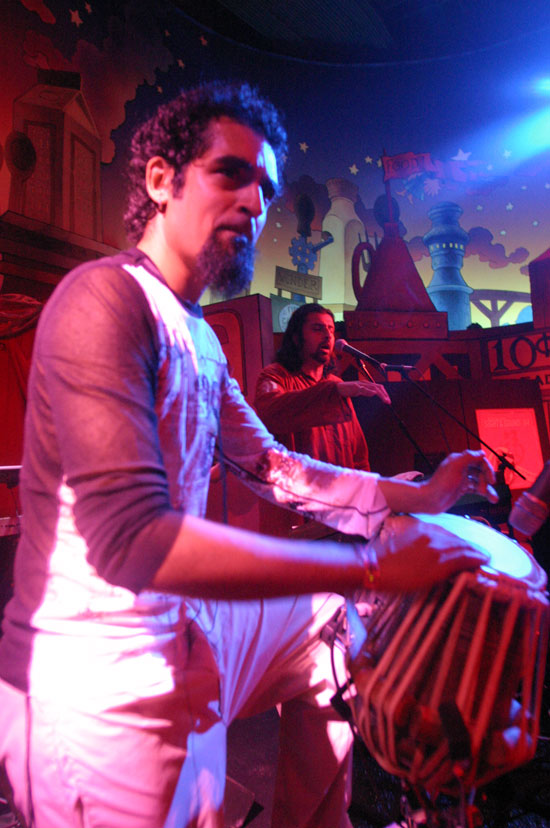
Karsh at the Project Ahimsa Global Sight & Sound 2003 Photo Credit: Danielle at Mizchief Media
Why did you decide to move to Los Angeles?
I moved to LA almost 2 years ago. I did it when there was a lot of chaos in my life, and I was traveling a lot…New York became the most chaotic stopover in my life, even though it was my home…I needed the change…I came out to LA to still be in the industry, and I had a lot of work on the west coast with Six Degrees Records and more…Also, I came to LA to get a little peace amidst the travel…but to be honest, in the last 2 years of living in LA, I have only spent a total of 3 months here because I have been traveling so much.
Have you noticed any differences in terms of acceptance of your music on the west coast?
There is a wider American acceptance of my music on the west coast…there is of course a huge south Asian infrastructure that has been built for this music to exist. There is on the west coast, a growing number of American people who are getting involved with the music on a deeper level. This is not a foreign music for them; rather, this is music that comes from where they come from.
Do you feel that people accept this music, respect your music?
It is not just about accepting or respecting my music or any music for that matter…it is about people reflecting on the music, and people feeling that the music makes sense to them. People accepting music doesn’t mean they will internalize it. I feel that the relationship people are having to my music is that it helps them make what is foreign seem more local.
Was it beneficial to be out on the west coast, and connect with the west coast crews as well?
Absolutely. I was able to expand the idea of my own party, Kollective, out on the west coast as well. By coming out here, I connected with Janaka of the Dhamaal crew and we worked on a few different events together: Worldly, Kollective, Dhamaal, and Project Ahimsa. I think it is important to be involved and connected to the different crews worldwide and that is keeping this music alive: creating the infrastructure around the country, these local crews holding it up in their own towns.
What is it like seeing these different crews around the world?
At this point, almost everywhere I have gone in the world, I have met people on a level where people are throwing huge weekly events where people are coming down to hear this music, maybe it is two passionate people who throw a small event every month, and we keep on doing it.
Everywhere I go in the world, I see that this music is reaching more people. The difference is, as with any industry, there needs to be a financial push to push it over the edge. All the artists who are working in this industry are working with independent budgets and independent labels, and it is much harder to compete in an industry saturated with pop music where millions of dollars are being funneled in just to market that music.
Is it changing? Is it getting better?
It is not really changing…it would only change if something appears a bit more pop, a bit more palatable for western audiences. Where the change needs to come from is from south Asians, our own community. We are one of the richest minorities in this country, and we need to start supporting our artists. That is what needs to happen. That is what the Latin artists did. They didn’t ask for money, they raised it themselves. They launched the careers of their artists, by spending their own money.
How is this different from India? Are the arts supported there?
I think that it is the same way even in India, where artists aren’t really supported in that communal sort of way. The arts, besides the classical arts, which is somewhat supported by the Government, as far as being a musician or being in a band, there is very little financial support for artists. Culturally, south Asians are deficient in supporting the arts…it used to be the job of the Mughal emperors and the royal courts to support the high arts; Now, society doesn’t really support the artist, we just enjoy it, we pay to hear some songs we like…but the idea of actually supporting an artist to build a career is a wholly western concept. It is becoming harder to convince our own communities to help us out…even in India, the only community that is getting such an influx of funding is Bollywood, because it sells and it is so visible on a mainstream level. It is similar here in America, because if an artist is not proven to sell, the financial risk factor for involved in getting behind an artist that is doing something different has to be something that has to be proven. History has shown that when Asian arts are supported by the west, only then are south Asian much more likely to become involved. But why can’t south Asians wholly support south Asian artists on their own?
How would your life have been different if you hadn’t been living here, performing?
At this point, I could have seen myself traveling the same path having grown up in India, as long as I lived the same lifestyle that I lived here…if I had the same opportunities to be open to all the impulses that I was open to here. As far as doing what I do here, at least for me, it is all because I grew up here. It was the battleground, the place where I had prepared to become myself…when I grew up, it was always about making music and playing it live in America.
Do you believe in lineage?
I don’t really believe in lineage…I think the examples of lineage that we see, people like Zakir Hussain, Alam Khan, Anoushka Shankar, or Aman or Amjad Ali Bangash…they very much deserve to have the spotlight that they do, because they have truly mastered and taken their art form to another level. In general, though, I don’t think there should be a rule for other artists to be excluded because they are not part of the lineage in any art form. But I think what happens is that people create a particular aesthetic around their own family lineage, their gharana, and they create rigid institutions around them and then as an artist you try to are forced to either fit that bill or you create your own. I think that is what people really need to understand and do because now it is possible to really be independent, not being ruled by a lineage system anymore. So what an artist needs to do to be noticed is to be able to create their own aesthetic around their own statement of this art form as opposed to trying to fit into all the institutions that exist.
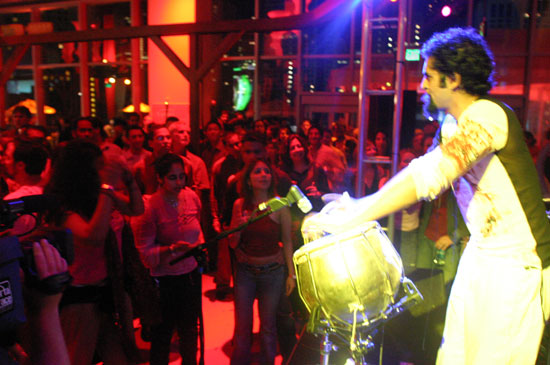
Karsh at the Project Ahimsa Global Sight & Sound 2003 Photo Credit: Danielle at Mizchief Media
What is going on with your music presently?
Well, nowadays I have been writing a lot more, focusing more on songwriting…I have been crafting a lot more composition off the computer, sitting with the guitar, sitting on a piano, sitting on a Fender Rhodes, writing songs, writing full compositions, even within Raags, and singing all different styles of Carnatic music, and doing a lot more human composition, and leaving the technology behind a bit…I’ve spent the last 12 years collaborating with so many different incredible artists, and I haven’t really sat down until recently and just looked at what I have received from all those experiences…Now I am in that kind of discovery mode as an artist, I am creating different music, and it better reflects my own musical path.
Do you feel that your music is an evolution of the Asian Massive movement?
When people talk about a movement, it sounds like such a large kind of thing…I think of hundreds of different incredible artists who are actually very individual…so I don’t really see my music as part of an evolution like that, I really only see the music as a progression for my self. For me, it is really important to be able to make music that is not, that doesn’t find itself in a category. For me, categories are disposable. Even though electronic music and dance music and lounge music wind up becoming cataloged music that ends up on millions of different compilations…those tracks don’t really live the life a song does, and for me that is what my pursuit is…to be able to really produce music that stays timeless in that way, stays with people…in the age of downloading music into iTunes and then to your iPod, it is amazing the amount of music we have access to…but on the other hand we are losing an intimate relationship with music, with the song.
Tell me about your involvement with Artwallah 2006.
I am one of the co-curators with Michael Dana, and we are basically scouting talent to be showcased at the event. I have picked out a few fantastic artists…One of them is a native San Francisco artist, Micropixie…I think Artwallah is great, I think it is important. I wish there was more support when I was a younger artist, when I was trying to get myself noticed…there was much less of that kind of infrastructure, or even a platform for people to come together, and a context as well…I think Artwallah is trying to create a context for artists to create within, because there is such a vastness about how to represent yourself artistically as a fusion of cultures. I think what they are doing is fencing that and letting people sit within that and express themselves…and through whatever medium it may be, film video, poetry or music, it is a grounded place. If artwallah continues, some real success stories are going to come from it.
One of the biggest challenges that artists face, an issue that does get addressed at Artwallah, is funding for artists…there needs to be more money for young artists to apply for grants, to get more support from the community to do what they do…to be a filmmaker, an author, to be any artists shouldn’t mean just paying for it themselves…at least as musician, you can get some gigs to climb that ladder…but there needs to be more support for artistic and business communities to come together to address these issues to sustain art forms. Because, first and foremost, being able to produce great art requires survival and sustainability.
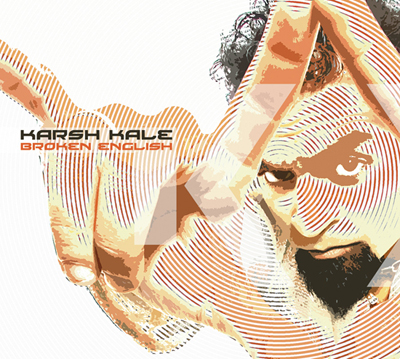
Karsh's latest album Broken English is now available on Six Degrees Records. Check out the latest information on Karsh's music and tourdates at www.karshkale.com.
Check out Karsh's latest album Broken English (Six Degrees Records) as well as his website,
Robin Sukhadia
Mr. Hyphen 2006/2007






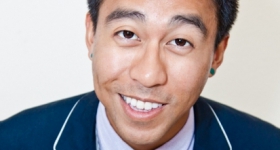
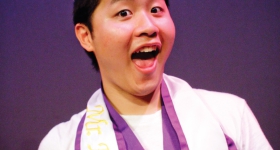
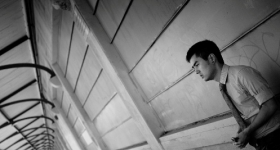
Comments